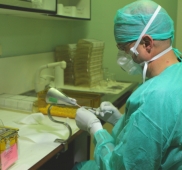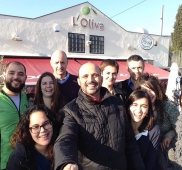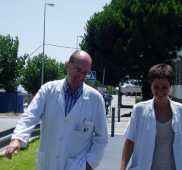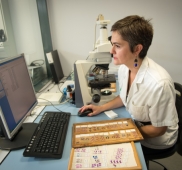The Unitat de Tuberculosi Experimental (Experimental Tuberculosis Unit, UTE) organises a 2 days conference: Correlating clinical and experimental TB pathology on 9 and 10 June 2016. Read more.
The Unitat de Tuberculosi Experimental (Experimental Tuberculosis Unit, UTE), was founded by Dr Pere-Joan Cardona in 1997. Located in the Can Ruti Campus as a unit of the Fundació Institut d’Investigació en Ciències de la Salut Germans Trias i Pujol (IGTP), the UTE is linked to the University (Microbiology and Genetics Department, Faculty of Medicine, Universitat Autonòma de Barcelona), and part of the research group “Grup de Microbiologia Clínica i Patologia Infecciosa Experimental de la Fundació Institut d’Investigació en Ciències de la Salut Germans Trias i Pujol” (2009 SGR 1485, leaded by Pr. V. Ausina), and the CRP-TB Consortium of the CIBERES net, funded by the Spanish Government.
UTE’s research is devoted to tuberculosis through 4 main Research lines:
- Experimental modeling of TB. PI: Pere-Joan Cardona.
This research line is devoted to the design, develpment and characterization of new experimental models (in vitro, in vivo and in silico) to a) study and better understand TB course: TB infection and progression to active disease; b) to better mimic TB in humans; and c) to study the influence of comorbidities in TB (as does within the H2020 EU-funded Consortia TBVAC2020 (Grant nº643381)).
- Evaluation of new prophylactic and therapeutic strategies against TB. PI: Pere-Joan Cardona.
The study of the immunopathology of the TB infection led Dr. Cardona to propose a new hypothesis (the Dynamic Hypothesis) to explain the Latent Tuberculosis Infection, and the design, patent and development of RUTI®, a therapeutic vaccine to shorten the chemotherapy of latent tuberculosis infection. RUTI® was evaluated in a successful Phase II Clinical Trial in SouthAfrica, and has also proved both a prophylactic and a post-exposure effect, generating 2 other patents. The vaccine was fully transferred to the biotech company named Archivel Farma S.L. for its manufacture under GMP conditions and further clinical development. Archivel Farma was created by created as a spin-off of the IGTP by Dr Pere-Joan Cardona, and he was its scientific director during many years. Thanks to the RUTI® project, the UTE has become an international reference to evaluate new prophylactic and therapeutic strategies, particularly vaccine candidates, being contracted by several institutes and biotech & pharma companies (Archivel Farma S.L., Grup Ferrer, GlaxoSmithKline); and included in several international consortia (“Preclinical and clinical evaluation of a post-exposure TB vaccine” Consortium, funded by the Bill & Melinda Gates Foundation GC#12; and 3 european consortia funded by the 7th Framework Program of the EC (STOPLATENT-TB (200999), NEWTBVAC (241745) and NOPERSIST (FP7-SME-2008-1, 232188)).
The Unit is currently involved as partner in the H2020 EU-funded Consortia TBVAC2020 (Grant nº643381) and the EMI-TB (Grant nº643558).
Depending on the final aim of the contractor, we can provide a wide portfolio of experimental animal models and services to evaluate prophylactic/therapeutic strategies against Tuberculosis, including:
- Effect on survival in a SCID murine model (safety-efficacy): Toxicity model for attenuated vaccines.
- Effect on survival and bacillary load in an active TB murine model (modified-Kramnik model in C3HeB/FeJ mice): Prevention of infection, Prevention of disease, Containment of Latent Tuberculosis.
- Effect on the bacillary load in an acute infection murine model: Prevention of infection.
- Effect on the bacillary load in a latency murine model: Immunotherapeutic application.
- Effect on the lesion dissemination (through High-resolution scanner (TAC) and histology-histometry) and bacillary load in a latency model in minipigs: Immunotherapeutic application.
- Effect on survival and bacillary load in a Multiple Consecutive Infections murine model: Prevention of infection, Prevention of disease, Containment of Latent Tuberculosis.
- Histometry analysis of the effect of vaccine candidates in pathology lung samples.
- Nyaditum resae®(NR) Project.
The recent research of the UTE on the evolution from latent infection towards active tuberculosis and the role that inflammation has in it, has led to a new patent and the creation of a new spin-off, Manresana de Micobacteriologia (MANREMYC) for the development of a new therapeutic strategy against TB, a food supplement called Nyaditum resae®. Dr Cardona is the CEO/CSO of this spin-off. For more info please visit Manremyc’s website.
. - Study of the role of inflammation in TB and its modulation through Host-Directed Therapies (HDT). PI: Cris Vilaplana.This research line was created thanks to the Miguel Servet 1 personal contract awarded to Dr. Vilaplana (CP13/00174), and includes:
- Study of TB lesions obtained in surgery: in search of best biomarkers correlating with TB pathology, clinical features, MDR cases and prognostic. In collaboration with the National Center of Tuberculosis and Lung Diseases (NCTLD)of Georgia.
- Evaluation in animal models and in clinical trials of repurposed drugs with anti-inflammatory effect (mainly common NSAIDs as ibuprofen and aspirin, statins and others). This project has allowed the UTE to be part of the collaborative network Africa-Europe Host-Directed Therapies Network (HDT-NET).
One of the main aims of the Unit is to collaborate and promote training and dissemination activities. The UTE has trained many people in animal experimentation, research on tuberculosis, vaccines’ development, knowledge and technical transfer, and innovation. We do continuously accept degree, master and other students from very different fields (medical, biomedic, physics, bioengineering), and we often have open PhD positions. Please do not hesitate in checking our blogsite from time to time and sending an email for vacancies or other opportunities. The Unit has organized three successful international Symposia and we are now organizing a TB meeting in Empúries (L’Escala, Costa Brava, Catalonia): “Correlating Clinical and Experimental Pathology” (8-10th June 2016, in collaboration with the TBVI) with the aim to gather basic researchers and clinicians to discuss the contribution of experimental animal models in the TB research field, and how experimental animal models could better mimic human disease.
For more info on us or our work, including publications, or to talk about please visit our blogsite.





